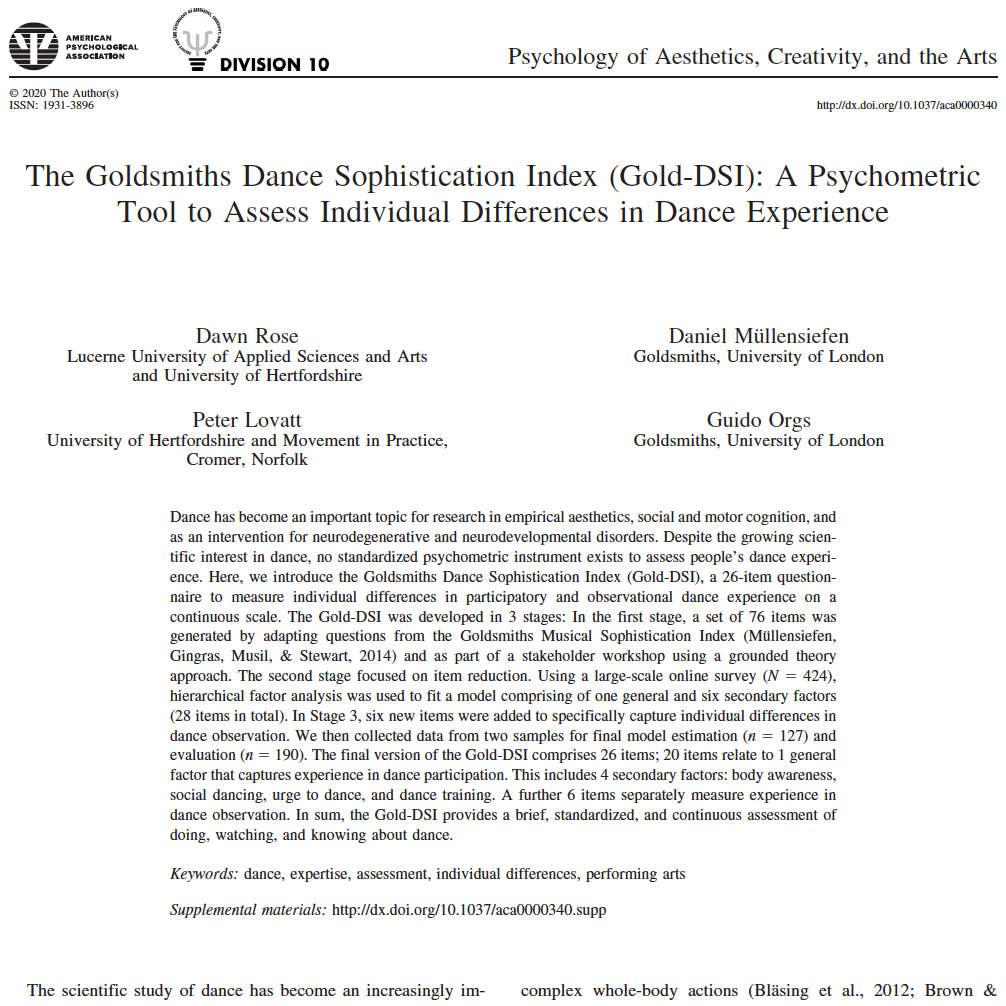
Rose, D., Mullensiefen, D., Lovatt, P.J., & Orgs, G. (2020). The Goldsmiths Dance Sophistication Index (Gold-DSI): A Psychometric Tool to Assess Individual Differences in Dance Experience. Psychology of Aesthetics, Creativity, and the Arts, http://dx.doi.org/10.1037/aca0000340
Dance has become an important topic for research in empirical aesthetics, social and motor cognition, and as an intervention for neurodegenerative and neurodevelopmental disorders. Despite the growing scientific interest in dance, no standardized psychometric instrument exists to assess people’s dance experience. Here, we introduce the Goldsmiths Dance Sophistication Index (Gold-DSI), a 26-item questionnaire to measure individual differences in participatory and observational dance experience on a continuous scale. The Gold-DSI was developed in 3 stages: In the first stage, a set of 76 items was generated by adapting questions from the Goldsmiths Musical Sophistication Index (Müllensiefen, Gingras, Musil, & Stewart, 2014) and as part of a stakeholder workshop using a grounded theory approach. The second stage focused on item reduction. Using a large-scale online survey (N=424), hierarchical factor analysis was used to fit a model comprising of one general and six secondary factors (28 items in total). In Stage 3, six new items were added to specifically capture individual differences in
dance observation. We then collected data from two samples for final model estimation (n=127) and evaluation (n=190). The final version of the Gold-DSI comprises 26 items; 20 items relate to 1 general factor that captures experience in dance participation. This includes 4 secondary factors: body awareness, social dancing, urge to dance, and dance training. A further 6 items separately measure experience in dance observation. In sum, the Gold-DSI provides a brief, standardized, and continuous assessment of doing, watching, and knowing about dance.
Dr Peter Lovatt spent over 20 years working as a university academic. He set up the Dance Psychology Lab to understand dance and dancers from a psychological, scientific perspective. His research has been published in peer-reviewed journals and his teaching has been highly commended. Find out more about his academic life here
Peter Lovatt is an author and he has written two books: “The Dance Cure, the surprising secret to being smarter, stronger, happier” was first published by Short Books in the UK in 2020. “Dance Psychology, the science of dance and dancers” was first published in the UK in 2018. Peter has also writes commissioned articles. Find out more about his writing life here
Peter Lovatt is an international keynote speaker who delivers groovy keynotes which inspire, entertain and get minds and pulses racing. Peter has given keynote talks around the world and he has worked with organisations from different sectors, for example, in the banking, tech, creative, education, health and automotive industries. Find out more about his keynotes here
Peter Lovatt is a founding director of the Movement in Practice (MiP) Academy. The MiP Academy is a specialist provider of education in the psychology of movement and dance. MiP Academy is an accredited provider of Continuing Professional Development (CPD), Continuing Education (CE) and Continuing Professional Education (CPE), providing both anytime learning and scheduled face-to-face learning opportunities. Find out more about MiP Academy here
Peter Lovatt became known as Dr Dance through his TV and media work. He first appeared as Dr Dance on the Graham Norton Show (BBC) in 2008 and Dr Dance has since made over 1000 appearances across all major UK TV and radio networks, in magazines and newspapers and on stage. Dr Dance has made several stage shows, including “Dance Dr Dance” (2010), “INSPIRED Psychology Danced” (2011) and “Boogie on the Brain” (2018). Find out more about Dr Dance here
Peter Lovatt lives on the beautiful north Norfolk coast with his partner and their two sons.
Find out more about Peter’s latest news here
